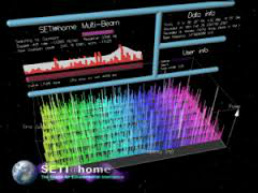
In the latest BBC News, academics from 11 institutions have set up a network to co-ordinate their Search for Extra-Terrestrial Intelligence (Seti). The English Astronomer Royal, Sir Martin Rees, will act as patron. The group is asking funding agencies for a small - about £1m a year - sum of money to support listening time on radio telescopes and for data analysis. It would also help pay for research that considered new ways to try to find aliens.
Currently, most Seti work is done in the US and is funded largely through private donation.
A University of St Andrews researcher told BBC News, "I don't know whether [aliens] are out there, but I'm desperate to find out. It's quite possible that we're alone in the Universe. And think about the implications of that: if we're alone in the Universe then the whole purpose in the Universe is in us. If we're not alone, that's interesting in a very different way."

In 1998-2003, the Jodrell bank, and its 76m Lovell radio telescope, set up Project Phoenix. It searched for signals from about 1,000 nearby stars. The Californian Seti Institute's effort ultimately found nothing.
Jodrell has since been updated, linking it via fibre optics into a 217km-long array with six other telescopes across England. Known as eMerlin, this system would be a far more powerful tool to scan the skies for alien transmissions.
And Jodrell itself is the management HQ for the forthcoming Square Kilometre Array, a giant next-generation radio observatory to be built in South Africa and Australia. It will have incredible power, not only to screen out interference from TV and phone signals here on Earth, but to resolve very faint signals at vast distances. It has been said the SKA could detect an airport radar on an alien world 50 light-years away.
One attraction of Seti is the great potential for "citizen science" involvement. If you asked all the people coming out of a science fiction movie whether they'd pledge money from the tax of that movie to determine if any of what they'd just seen was for real, most would agree.
Searching for extraterrestrial life using whale song technology. Source.

It turns out that Zipf's Law appears to describe a distribution of signals that is necessary to make a language.
They applied these techniques to humpback whales, in part because they are also a socially complex species, and in part because they rely — as the dolphins do — on vocal communication more than gestural or facial expressions. This species also had a global communication system millions of years before humans did.

In addition to radio searches, optical SETI is now becoming more widespread. Radio SETI is looking for narrow-band transmissions. Optical SETI, however, relies on the detection of nanosecond pulses of light.
The search for extraterrestrial intelligence is a fascinating field and encompasses astrophysics to animal communications, and from paleontology to quantum mechanics. At present, it is symbolized by a radio telescope, but that's just the tip of the iceberg.
However, most of the public's interest in astronomy derives from its interest in finding life in space. My husband insists that there must be many other forms of intelligence. He says it's ridiculous to see ourselves as special. I hold onto the thought that God created man in his image. Although God may have created other forms of life, the bible assurance makes man special.

 RSS Feed
RSS Feed






